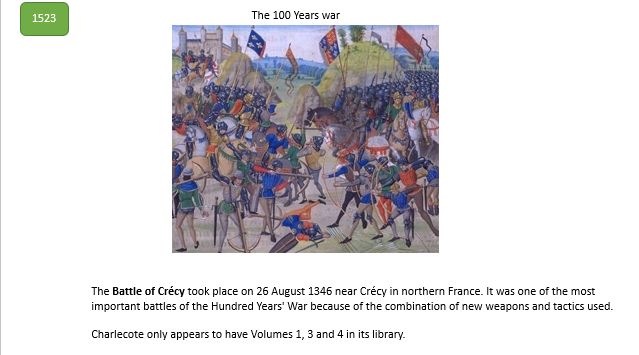2 of 2
The illustrations are hand coloured but the Charlecote copy does not
appear to have those being laft as woodcuts. The Conservator,Caroline
Bendix, thinks they are on manuscript copies of the text but not the
printed text. The book has also been rebound.
The complete chronicles are available on-line and here is a sample
OF THE ORDER OF THE ENGLISHMEN AT CRESSY, AND HOW THEY MADE THREE BATTLES
AFOOT
ON the Friday, as I said before, king Edward III of England lay in the
fields, for the country was plentiful of wines and other victual, and
if need had been, they had provision following in carts and other carriages.
That night the king made a supper to all his chief lords of his host
and made them good cheer; and when they were all departed to take their
rest, then the king entered into his oratory and kneeled down before
the altar, praying God devoutly, that if he fought the next day, that
he might achieve the journey to his honour: then about midnight he laid
him down to rest, and in the morning he rose betimes and heard mass,
and the prince his son with him, and the most part of his company were
confessed and houselled; and after the mass said, he commanded every
man to be armed and to draw to the field to the same place before appointed.
Then the king caused a park to be made by the wood side behind his host,
and there was set all carts and carriages, and within the park were
all their horses, for every man was afoot; and into this park there
was but one entry.
Then he ordained three battles: in the first was the young prince of
Wales, with him the earl of Warwick and Oxford, the lord Godfrey of
Harcourt, sir Raynold Cobham, sir Thomas Holland, the lord Stafford,
the lord of Mohun, the lord Delaware, sir John Chandos, sir Bartholomew
de Burghersh, sir Robert Nevill, the lord Thomas Clifford, the lord
Bourchier, the lord de Latimer, and divers other knights and squires
that I cannot name: they were an eight hundred men of arms and two thousand
archers, and a thousand of other with the Welshmen: every lord drew
to the field appointed under his own banner and pennon.
In the second battle was the earl of Northampton, the earl of Arundel,
the lord Ros, the lord Lucy, the lord Willoughby, the lord Basset, the
lord of Saint-Aubin, sir Louis Tufton, the lord of Multon, the lord
Lascelles and divers other, about an eight hundred men of arms and twelve
hundred archers.
The third battle had the king: he had seven hundred men of arms and
two thousand archers. Then the king leapt on a hobby, [Note: 'Un
petit palefroi.']with a white rod in his hand, one of his marshals on
the one hand and the other on the other hand: he rode from rank to rank
desiring every man to take heed that day to his right and honour. He
spake it so sweetly and with so good countenance and merry cheer, that
all such as were discomfited took courage in the seeing and hearing
of him. And when he had thus visited all his battles, it was then nine
of the day: then he caused every man to eat and drink a little, and
so they did at their leisure. And afterward they ordered again their
battles: then every man lay down on the earth and by him his salet and
bow, to be the more fresher when their enemies should come.


